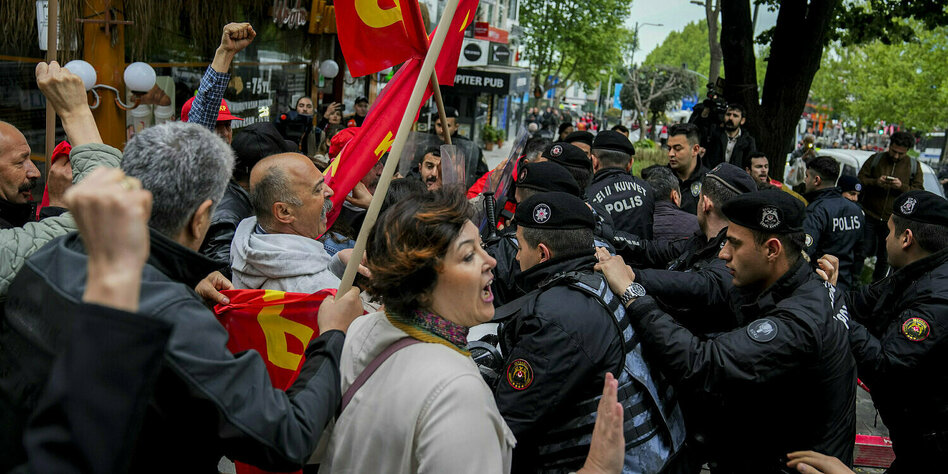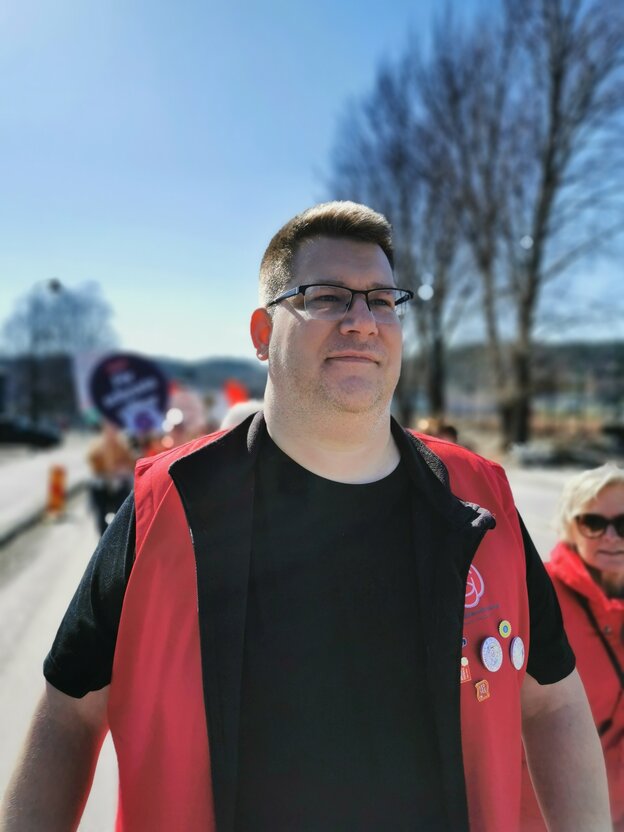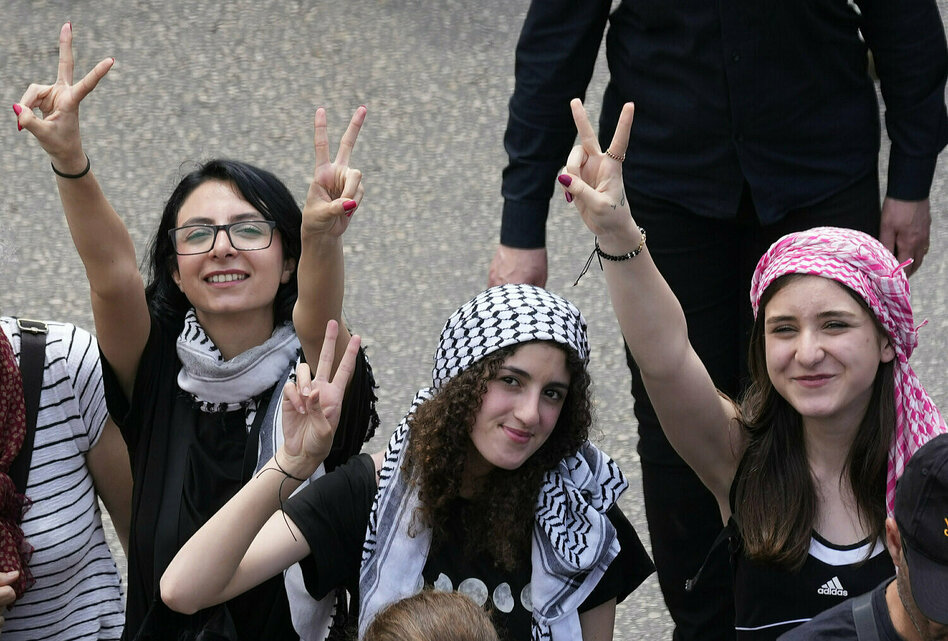
Photo: Khalil Hamra/ap/dpa
While there is tumult in Istanbul, Swedish social democrats sing songs in Kramfors. In Beirut, women fight for their rights.
TOBe careful, come back, they are using tear gas!” “A group of young people comes running towards the town hall square, coughing and panting.
Jürgen Gottschlich from the Eurasian metropolis of Istanbul:
“The police are attacking,” shouts another. “Instead of the May celebrations, this year we will hold a police festival in Istanbul.” A few hundred meters from Istanbul City Hall, in the Saraçhane district, heavily armed police had lined up and blocked the street in several rows.
Behind police lines, several water cannons were waiting to be used. After the demonstration, some leftist groups tried to break the police barricade. Then, the police advanced step by step like a Roman legion against the city hall.
More than 42,000 police prevented unions and the opposition from holding a May Day demonstration in Istanbul's central Taksim Square. Instead, the demonstration took place near city hall. Half the city was cordoned off: parts of ferry traffic, several subway lines and 30 main streets were disrupted.
Unlike previous years, this year the CHP party leadership expressed solidarity with the unions and called on the government to clear the way to Taksim Square. But it was useless. Istanbul Mayor Ekrem Imamoğlu (CHP) was also not allowed to enter his city center.
At the demonstration in front of the city hall, Imamoğlu and the leader of the largest opposition party, CHP, Özgür Özel, condemned the undemocratic and legally inadmissible ban on demonstrations in Taksim Square. Together with the two trade union organizations Disk and Kesk, the newly re-elected mayor and the leader of the CHP party called on people to gather at City Hall Square and march from there to Taksim Square.
However, two days earlier, by order of the Ankara government, the governor of Istanbul had already banned a demonstration in Taksim Square. This was not a surprise because since the Gezi protests in 2013, which took place mainly in Taksim Square, the Erdoğan government no longer allows demonstrations in the square and has also banned demonstrations in the surrounding streets.
The always busy Istiklal Caddesi, Istanbul's main shopping street, was completely empty on Wednesday. Only a few tourists armed with wheeled suitcases were able to get through the tough police barriers. Other images came from the capital, Ankara, and the Aegean metropolis, Izmir. While in Ankara the protesters mainly had to deal with torrential rain, the inhabitants of Izmir held a big May festival right on the seafront without being bothered by the police.
However, the annual May demonstrations and recurring disputes over access to Taksim Square over the years obscure the fact that trade unions in Turkey are generally weak and the level of organization is very low.
This is because union work has been severely restricted since the military coup of 12 September 1980 and anti-union legislation is still in force today.
Quiet May 1st in Sweden
Anne Diekhoff from the small town of Kramfors in northern Sweden:
For Ida, feminism and environmental protection are the most important issues. She is eleven years old and is one of the youngest in the Social Democrats' May Day parade.
It's the premiere of Ida. Anne-Marie Sollén, on the other hand, is a May Day veteran. “I was born a social democrat,” she says, that was in 1936. For many decades she was active in local politics and in unions. “I love the Social Democrats,” she also says. Because? Her summary: “Peace and freedom, care for the little ones, work for everyone.”

Pelle Anderzon is the leader of the Social Democrats in Kramfors Photo: Anne Diekhoff
They have been gathering in the florist's parking lot since 12:30 pm If more than 100 people come, you're happy, says Maria Persson of the municipal employees' union. At 1:00 p.m. the train with at least 80 people will begin to circulate.
Maria Persson is 65 years old and works in a daycare. The most important concern for them today is more personal geriatric care. “When Corona existed, people applauded them and now they are worthless,” she complains. The staff is overloaded. And she also feels sorry for the elderly, who can't even go out for ice cream anymore because no one has time to accompany them anymore. The municipality is economically weak and needs to save money, yes, but not like this.
A match ends on the sports field next door when the train pulls away; The first audience is some young people tired of playing football. Here you live quite far from big politics. The good times of the logging industry are decades behind us, as are those of social democracy. As the procession of impassive people passes by an apartment building, people wave from balconies, the brass band plays the Internationale, and Anna-Belle Strömberg waves back. She is Stockholm's star guest and a member of the region's Reichstag.
At his side walks Pelle Anderzon, who as president of the local branch of the Social Democrats is the host. Why do you still think this march is important in 2024? “This is our history, and without our history we cannot shape the future,” he says. They defend the fact that all people are worth the same. Anderzon remembers that last week they set fire to a pride flag hanging in front of an apartment in Kramfors. “Today we take to the streets for our values.”
About 100 people wait for the procession in the market square and there is coffee at the festival stand. A man with a guitar enters the stage. His song: “We don't have factories, we don't have capital, but we have our solidarity.” The speech of the Reichstag deputies promises solidarity with Ukraine, but also with those suffering the economic consequences of the war in Sweden. The Social Democratic Party wants more money for the health sector, higher child benefits and control of the banking and electricity markets. And now the EU elections would come: the EU is Sweden's safe haven, the elections are important in the fight against the right. Friendly applause from the people on the beer benches.
Brave domestic workers without labor rights
Julia Neumann from Beirut:
For foreign domestic workers in Lebanon, there is little to celebrate on Labor Day. They are excluded from labor law. Labor legislation prohibits them from even forming unions.
Around 250,000 foreign domestic workers live in Lebanon. Men usually clean windows, work in garbage collection or at gas stations. Women work as cleaners and housewives. They also take care of the elderly, because taking care of the elderly is a private matter in Lebanon. In exchange, the family had to pay the employees food, clothing, salary and accommodation.

Foreign employees fight for their dignity in Lebanon Photo: Hussein Malla/ap
The reality is different: “Often the workers don't even have a room, they sleep in the living room, in the hallway, in the bathroom or on the balcony,” describes the situation Messi Mandefru, from the NGO Egna Legna. Ethiopian domestic workers in Lebanon. “You have to wait for everyone to go to bed before you can sleep. They work every day, often continuously, and don't even sleep four hours. “They are prohibited from communicating with their families or talking to their neighbors.”
Exploitation begins with the agencies. They hire workers in Ethiopia, the Philippines or Pakistan and often charge high fees for this. In exchange, they promise a good salary in US dollars that the workers will be able to send to their families. Behind this is a system of exploitation: your work visa is linked to the name of the employer, the Kafil, which translates as sponsor. Anyone who leaves their job because they are not paid is in the country illegally because the residence permit is linked to the sponsor.
The authorities support the exploitation. At the airport, women sometimes wait for days in a small room under the supervision of authorities without food for their sponsors to pick them up. “When they get home, they must work immediately, without rest. “Businessmen throw away personal belongings because they are supposedly not clean and they force us to shower,” says Mandefru. “Confiscate personal items such as phones and passports. Visitors are also not allowed.” Constant worry about doing something wrong or being punished, as well as the risk of being mistreated, strongly influence the psyche: depression, anxiety disorders, suicidal thoughts.
Due to social isolation and fear of consequences, it is very difficult to even leave the house, let alone go out on the streets to protest on May 1. However, brave migrants in Lebanon are organizing and forming communities in this deeply unjust situation. Women in particular are on the front lines fighting for fairer working conditions for all. NGOs such as Egna Legna organize accommodation, food, return flights, but also meetings and additional training or psychological support. They fight to recover passports and want to abolish the kafala system, which they describe as modern slavery. Lebanon should include workers in labor legislation, “which would protect us from all these horrors.”
An initiative of this type was taken in 2020 by the then Minister of Labor. But the recruitment agency's union filed a complaint and the Supreme Administrative Court blocked the implementation of a standard contract with a minimum wage and protection measures against forced labor. “Lebanon is a democratic country. Why are we, as domestic workers, excluded from this?” asks Amira Gidey of Egna Legna.
